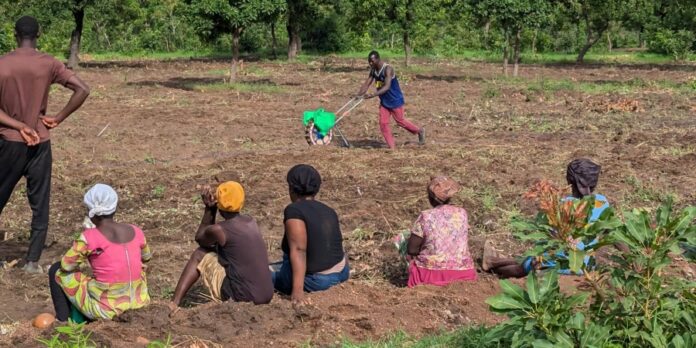Illustrative Image: Enhancing Climate Resilience in Ghana: PRISMA Review Reveals Agricultural and Non-Agricultural Adaptation Strategies Driving Sustainability
Image Source & Credit: Alliance Bioversity & CIAT
Ownership and Usage Policy
A recent study by Takal et al. (2025) titled “Enhancing resilience to climate change: a comprehensive PRISMA review of agricultural and non-agricultural adaptation strategies for Ghana“, published in Cogent Social Sciences, reveals that Ghanaian farmers employ a wide range of agricultural adaptation strategies to cope with climate variability and uncertainty.
“
Ghanaian communities, especially farmers, are adapting to climate change through diverse strategies but face barriers from weak institutions and limited resources.– Takal et al. 2025
The study presents a systematic examination of how Ghanaian communities, particularly smallholder farmers, are responding to the escalating threats posed by climate change. Using the PRISMA methodology (Preferred Reporting Items for Systematic Reviews and Meta-Analyses), the study rigorously analyzes 20 empirical studies published between 2012 and 2024 to assess existing adaptation strategies, identify knowledge and policy gaps, and propose ways to strengthen national and community-level resilience. The findings reveal that Ghanaian farmers employ a wide range of agricultural adaptation strategies to cope with climate variability and uncertainty. Key measures include crop diversification to reduce dependence on single crops, the adoption of drought-resistant varieties, and adjustments in planting schedules to align with shifting rainfall patterns. Additionally, improved irrigation systems and agroforestry practices are used to conserve water, enhance soil fertility, and support biodiversity, while soil moisture conservation techniques such as mulching and zero-tillage further boost productivity and sustainability.
In the livestock sector, farmers adopt complementary strategies such as mixed farming systems combining stall-feeding with open grazing, seasonal migration to access better pasture, and the breeding of heat-tolerant and disease-resistant animals. They also manage water and shade resources to minimize heat stress and rely on emergency fodder reserves during drought periods. Beyond agriculture, non-farming communities demonstrate innovative non-agricultural adaptation strategies that enhance resilience and livelihood security. These include seasonal labor migration to urban areas to diversify income sources, small-scale enterprises and dry-season gardening to cushion economic shocks, and the strengthening of community associations and cultural practices that foster social cohesion, shared learning, and mutual support in times of stress.
How the Study was Conducted
The study used a systematic review guided by the PRISMA framework to ensure a transparent and replicable process. Researchers searched Web of Science and ProQuest, focusing on empirical studies published in English (2012–2024) about climate change adaptation in Ghana. Out of 336 articles, only 20 met the inclusion criteria after a detailed screening and full-text review. Data were then analyzed to identify agricultural and non-agricultural adaptation strategies. By following PRISMA, the study ensured rigour, credibility, and comprehensive insight into how Ghanaian communities are responding to climate change.
What the Authors Found
The author found that Ghanaian communities particularly farmers are actively adapting to climate change through diverse agricultural, livestock, and non-agricultural strategies, but their efforts are limited by inadequate institutional support, poor infrastructure, and lack of access to technology and climate education.
Why is this important
Climate Change’s Growing Impact on Ghana
Ghana faces rising temperatures, declining rainfall, and reduced water availability—conditions that threaten agriculture, livelihoods, and food security for millions, particularly smallholder farmers with limited resources.
Farmers as Agents of Adaptation
The study reveals that Ghanaian farmers are actively responding to climate stress through innovative strategies such as drought-resistant crops, agroforestry, and diversified livestock systems, strengthening resilience and sustainability.
Persistent Gaps in Knowledge and Policy Support
Despite local innovation, adaptation is hindered by poor access to technology, weak extension services, limited climate education, and inadequate institutional frameworks—highlighting the need for stronger policy and capacity-building efforts.
Beyond Agriculture: Social and Economic Resilience
Non-agricultural strategies like seasonal migration, income diversification, and community-based support systems play vital roles in helping households cope with climate impacts.
Lessons for Wider Application
Using the PRISMA framework, the study provides a replicable, evidence-based blueprint for strengthening climate adaptation in Ghana and other vulnerable regions across Sub-Saharan Africa.
What the Authors Recommended
- Expand climate education for all age groups, enhance agricultural extension services, and provide specialized training for local officials and farmers to promote informed, climate-smart decision-making.
- Establish dedicated climate adaptation bodies, integrate climate risks into national development plans, eliminate maladaptive subsidies, and introduce market-based incentives like carbon credits and climate insurance.
- Promote agroforestry, drought-resistant crops, efficient irrigation systems, and soil moisture conservation through practices such as mulching, zero-tillage, and organic farming.
- Encourage the breeding of heat- and disease-tolerant animals, improve water and shade access, promote pasture rotation, and train herders in fodder conservation and adaptive livestock management.
- Recognize seasonal migration as a valid coping mechanism, and foster income diversification through small businesses, dry-season gardening, and craft enterprises to reduce overdependence on farming.
- Document and preserve indigenous knowledge, encourage community-based learning, and create platforms for sharing successful adaptation practices across regions to amplify local resilience efforts.
In conclusion, the study underscores that while Ghanaian communities are demonstrating remarkable innovation and resilience in adapting to climate change, achieving lasting sustainability will depend on stronger institutional support, inclusive policies, and enhanced access to education, technology, and climate-smart resources.
















 The African Research (AR) Index is a comprehensive scholarly directory and database focused explicitly on journal publishers that publish and disseminate African research.
The African Research (AR) Index is a comprehensive scholarly directory and database focused explicitly on journal publishers that publish and disseminate African research.

